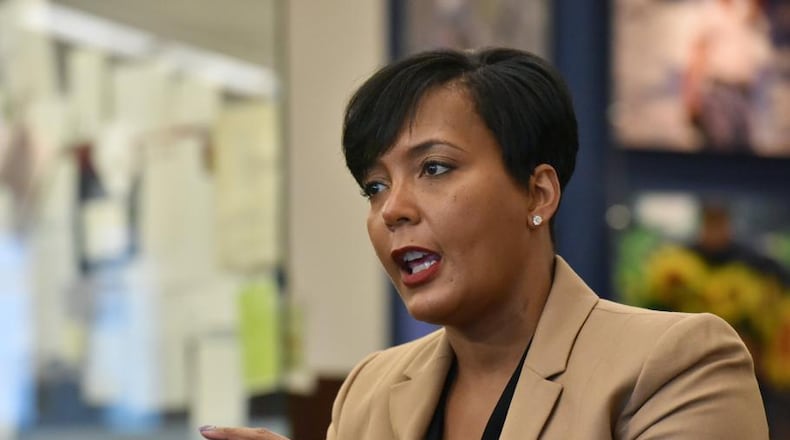When the Atlanta City Council created an independent compliance office in March to investigate allegations of fraud, waste and abuse, the action marked the most sweeping effort to date to address concerns swirling around a federal corruption investigation into City Hall.
But since then a central question has dominated discussion about the new city office.
Would Mayor Keisha Lance Bottoms designate funds for it in next year’s budget?
At a council budget hearing on Tuesday, Bottoms finally answered — but with significant ambiguity.
VIDEO: Previous coverage of this issue
Earlier this year, Bottoms announced the formation of a public trust task force to study the city’s policies and procedures regarding ethics, transparency and compliance. On Tuesday, Bottoms said that the group hadn’t yet completed its work.
“We thought it would be premature to do a carve out [in the budget] specifically for [the compliance office] without knowing what their recommendations will be,” Bottoms said.
Hours earlier at another hearing, several council members said that they would not support the mayor’s budget unless it included funding for the compliance office.
“I’ve had numerous citizens reach out to me,” said Councilwoman Jennifer Ide. “I’ve had the press reach out to me after having seen this budget that doesn’t have funding for it. I have assured them that it will be funded. I will not pass a budget that does not have funding for this piece.”
The city has until June 30 to finalize its fiscal 2020 budget, and Tuesday’s remarks from the mayor and some on the council have set the stage for what could become a contentious climax to a year-long battle that has been building behind closed doors at City Hall.
As new details emerged about corruption under the administration of former Mayor Kasim Reed, leaders on the the city council and Bottoms have competed for who will lead the push to restore public confidence. Reed left office in December 2017.
Council members have expressed frustration that the mayor takes credit for their initiatives. Bottoms' supporters have accused some council members of opposing her to raise their own political profiles.
Over the past several months, the maneuvering surrounding the compliance office has provided perhaps the most striking example yet of the awkwardness inherent in the politics of reform.
Bottoms campaigned for mayor in 2017 on a 10-point ethics package. Point three was an independently funded compliance officer.
When Council President Felicia Moore and Ide unveiled proposed legislation establishing a compliance office in January, the mayor's office told The Atlanta Journal-Constitution that it wasn't what Bottoms originally envisioned.
Within weeks, Bottoms office announced legislation for the “Task Force for the Promotion of Public Trust,” a group that would “guide the City as we institute a rigorous system for accountability, strengthening public trust in government.”
The council continued refining the compliance legislation. It approved a revised version on March 4 that expanded the city’s ethics board to the Board of Ethics and Independent Compliance. The council also passed a resolution calling on the mayor to fund the office with $1.4 million.
That day Bottoms’ office issued a statement that seemed to indicate her position on the compliance office had changed.
“One of the cornerstones of our campaign was to usher in a new era of transparency and integrity in City government,” Bottoms said at the time. “Thank you to the City Council for this piece of legislation to assist this administration in the larger effort to build the more accountable government the people of Atlanta deserve.”
But when the time came to put money behind her statement, the mayor’s enthusiasm appeared to have waned.
On Tuesday, Bottoms said she had set aside $300,000 that might be used to fund the office, an amount less than a quarter of what the council requested.
The story so far
Jan. 22: Atlanta City Council President Felicia Moore and Councilwoman Jennifer Ide unveil plan to create independent office of compliance to investigate fraud, waste and abuse.
Feb. 4: Mayor Keisha Lance Bottoms announces plan to establish Task Force for the Promotion of Public Trust
March 4: Council approves legislation expanding ethics board to the Board of Ethics and Independent Compliance. Bottoms praises council's action.
June 4: Mayor Keisha Lance Bottoms tells city council that she doesn't want to fund compliance office until her task force has made its recommendations.
About the Author
Keep Reading
The Latest
Featured


